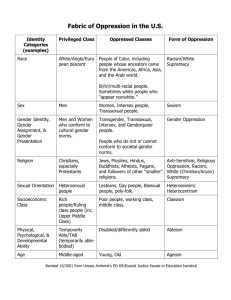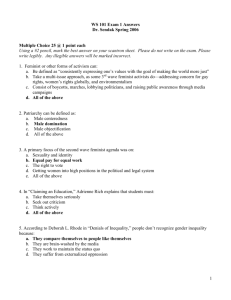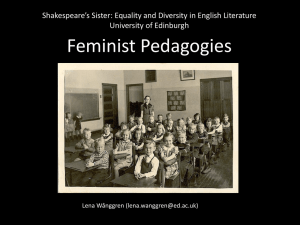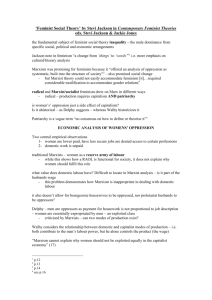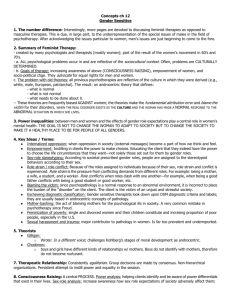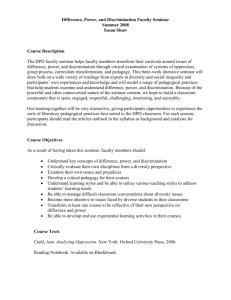Chapter 2 Readings
advertisement
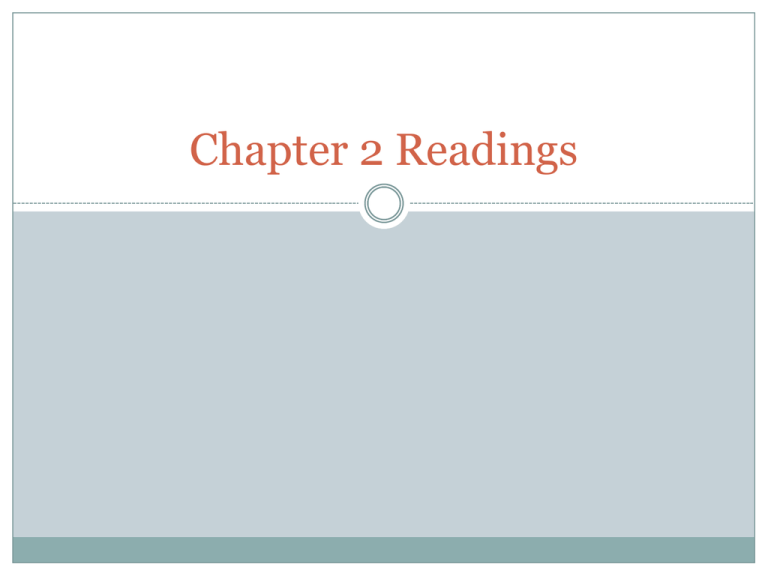
Chapter 2 Readings Patricia Hill Collins Representative Works Black Feminist Thought: Knowledge, Consciousness and the Politics of Empowerment Race, Class and Gender: An Anthology (edited with Margaret Anderson) Fighting Words: Black Women and the Search for Social Justice Black Sexual Politics: African Americans, Gender, and the New Racism From Black Power to Hip Hop: Racism, Nationalism, and Feminism “Toward a New Vision” Need to rid ourselves of either/or and dominant/subordinate dichotomous thinking Instead we need to reconceptualize oppression by uncovering connections between race, class, and gender as categories of analysis Oppression Institutional (antebellum plantation) – who holds positions of power, and who holds lowest positions? Symbolic – socially sanctioned ideologies used to justify relations of domination and repression (stereotypical images) Individual – cumulative effect of our life experiences within multiple structures of oppression Transcending Barriers We need to recognize that each of us lives within a system that vests us with varying levels of power and privilege. We need to build effective coalitions instead of focusing on a common enemy. We need to develop empathy for the experiences of individuals and groups different than ourselves. We all need to examine our position. Questions How can we begin to reconceptualize race, class, and gender as categories of analysis (how do we move beyond either/or and superior/inferior)? How can we begin to develop common causes and develop empathy, no matter which side of privilege we inhabit? Marilyn Frye Representative Works Politics of Reality: Essays in Feminist Theory Willful Virgin: Essays in Feminism, 1976-1992 Feminist Interpretations of Mary Daly (edited with Sarah Lucia Hoagland) “Essentialism/Ethnocentrism: The Failure of the Ontological Cure” “Categories and Dichotomies” in Encyclopedia of Feminist Theories “Categories in Distress” in Feminist Interventions in Ethics and Politics “Oppression” What is oppression? How does being oppressed differ from being judged or criticized harshly? Are women caught in a series of no-win situations? Who is doing the criticizing/judging? (For example, who criticizes women for being sexually active or sexually inactive? Who criticizes women for having children or not having children? For marrying or not marrying?) Felice Yeskel Representative Work Pioneering lesbian activist in 1970s 1985: Co-founded the Stonewall Center at the University of Massachusetts, one of the first GLBT Centers at a major university 2001: Economic Apartheid in America: A Primer on Economic Inequality and Insecurity 2005: co-founder and Executive Director of Class Action (www.classism.org) “Opening Pandora’s Box” Adding classism to the list of “isms” makes us uncomfortable No commonly agreed upon definition of class Gap between rich and poor in US greatest it has been since 1929 Economic class is much less fluid than people think Myth of the American Dream Classist stereotypes/prejudice Existence of class necessitates class inequality Group Questions Do we as a society blame the poor for being poor? Why are we so uncomfortable talking about issues related to class? Do you agree with Yeskel’s statement that “Disrespect is harmful”?



